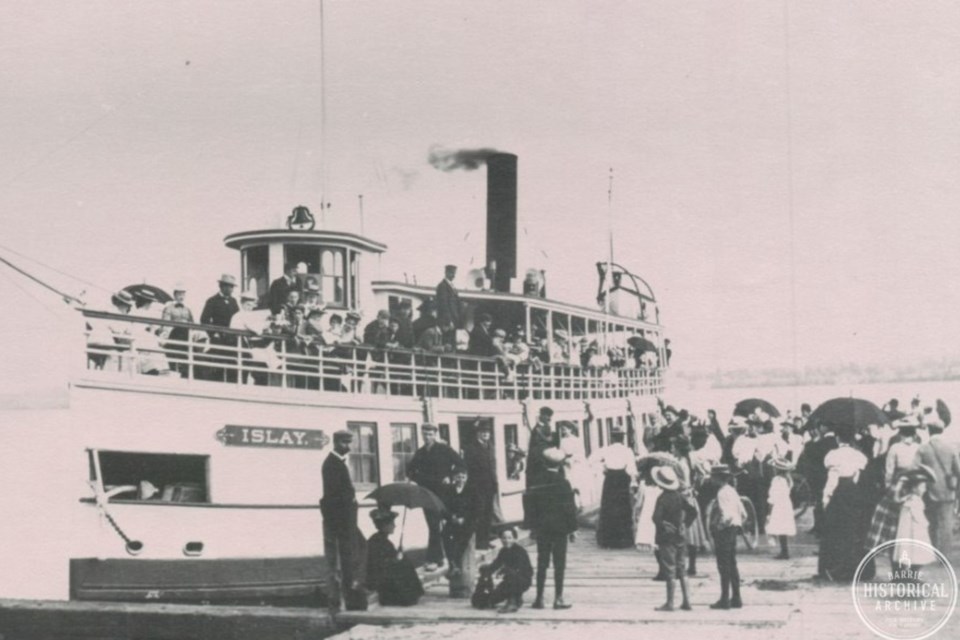Editor's note: To read Part 1, click here.
In 1881, things were looking rosy for the Great Northern Transit Company. The company was running three steamships up and down the shores of Georgian Bay — Northern Belle, Emerald and Manitoulin, the latter being in the charge of Capt. Peter Campbell.
That year, during one of the notorious autumn gales known to afflict that region, the steamer City of Owen Sound ran aground near Gore Bay on Manitoulin Island. Capt. Campbell and the Manitoulin were making a return trip from northern points and were soon on the scene to assist the trapped steamer.
Much of the City of Owen Sound’s cargo of 30,000 bushels of wheat had to be thrown into the water to get her moving again. She was towed by Manitoulin to Gore Bay for repairs.
Seven months later, it was the City of Owen Sound that steamed into Collingwood with some very bad news for the people of that town. The Manitoulin had burned near Manitowaning resulting in loss of life.
Near Killarney on Georgian Bay, the City of Owen Sound had encountered a small boat. In it, were several Indigenous men and one white man, who turned out to be Andrew Johnston, a mate on the Manitoulin.
In Collingwood, Johnston described a scene of chaos. After a shattered oil lamp ignited a fire below deck, there was a frenzied rush for the life boats. The first one readied was immediately filled, but its rigging came apart and all occupants were suddenly dropped into the water. Others simply jumped overboard.
The panic may have been well warranted. It has been said that the Manitoulin was carrying some 500 pounds of blasting powder intended for the Canadian Pacific Railway who were building more rail lines in northern Ontario. This dangerous cargo was hastily dropped overboard by the crew.
There would most certainly have been panic in the town of Collingwood as well. Family and friends of the passengers and crew would have been desperate for news.
Capt. Campbell was 36 years old at the time, a married father of two, with another child on the way. His second son, Peter McLean Campbell Jr., was born four months later.
The captain would live. In fact, he would become a legend for the way he handled the doomed Manitoulin on the 18th of May, 1882. Capt. Campbell would go on to head more steamships, have more children, and pass away on land in old age, but not before he went through the battle of his career.
At first, there was very little information to comfort the worried people waiting at the Collingwood harbour. On the 19th, the City of Owen Sound brought her shocking news that the Manitoulin had taken fire and been destroyed. It was known that two persons, a man and a small girl, had perished.
Later that day, a second dispatch of news reached the town. The steamer Northern Belle had reached her scheduled destination at Algoma Mills and would be immediately turning around to bring aid to the disaster scene. No more news was likely until Northern Belle’s return to Collingwood.
More news did come, though. The last update of May 19 announced that the loss of life had been greater than first anticipated. At that time, if appeared that some 20 to 50 people had lost their lives.
One of the more detailed accounts of the Manitoulin disaster came much later and was told by the steamer’s chief engineer, who had suffered serious burns in the struggle to save the vessel and those aboard her.
He described being in the act of putting his jacket on to attend the midday meal when the second engineer came rushing in. The boat was on fire! A small engine was started and the fire hose was brought out.
As smoke crept overhead, the chief engineer called out that the engine was ready to pump water through the hose.
No reply came. The increasing fire had driven the other crew members away.
The chief engineer was on his own.
Next week: Part 3
Each week, the Barrie Historical Archive provides BarrieToday readers with a glimpse of the city’s past. This unique column features photos and stories from years gone by and is sure to appeal to the historian in each of us.



